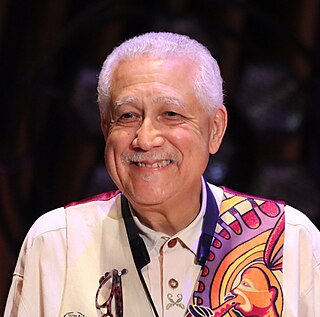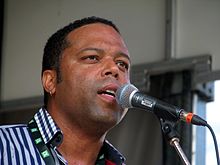
Callen Radcliffe Tjader Jr. was an American Latin Jazz musician, often described as the most successful non-Latino Latin musician. He explored other jazz idioms, especially small group modern jazz, even as he continued to perform music of Africa, the Caribbean and Latin America.

Dionisio Jesús Valdés Rodríguez, better known as Chucho, is a Cuban pianist, bandleader, composer and arranger whose career spans over 50 years. An original member of the Orquesta Cubana de Música Moderna, in 1973 he founded the group Irakere, one of Cuba's best-known Latin jazz bands.
Afro-Cuban jazz is the earliest form of Latin jazz. It mixes Afro-Cuban clave-based rhythms with jazz harmonies and techniques of improvisation. Afro-Cuban music has deep roots in African ritual and rhythm. The genre emerged in the early 1940s with the Cuban musicians Mario Bauzá and Frank Grillo "Machito" in the band Machito and his Afro-Cubans in New York City. In 1947, the collaborations of bebop trumpeter Dizzy Gillespie and percussionist Chano Pozo brought Afro-Cuban rhythms and instruments, such as the tumbadora and the bongo, into the East Coast jazz scene. Early combinations of jazz with Cuban music, such as "Manteca" and "Mangó Mangüé", were commonly referred to as "Cubop" for Cuban bebop.
A descarga is an improvised jam session consisting of variations on Cuban music themes, primarily son montuno, but also guajira, bolero, guaracha and rumba. The genre is strongly influenced by jazz and it was developed in Havana during the 1950s. Important figures in the emergence of the genre were Cachao, Julio Gutiérrez, Bebo Valdés, Peruchín and Niño Rivera in Cuba, and Tito Puente, Machito and Mario Bauzá in New York. Originally, descargas were promoted by record companies such as Panart, Maype and Gema under the label Cuban jam sessions. From the 1960s, the descarga format was usually adapted by large salsa ensembles, most notably the Fania All-Stars.

Machito was a Latin jazz musician who helped refine Afro-Cuban jazz and create both Cubop and salsa music. He was raised in Havana with his sister, singer [Graciela].

Francisco de Jesús Rivera Figueras, known as Paquito D'Rivera, is a Cuban-American alto saxophonist, clarinetist and composer. He was a member of the Cuban songo band Irakere and, since the 1980s, he has established himself as a bandleader in the United States. His smooth saxophone tone and his frequent combination of Latin jazz and classical music have become his trademarks.

Israel López Valdés, better known as Cachao, was a Cuban double bassist and composer. Cachao is widely known as the co-creator of the mambo and a master of the descarga. Throughout his career he also performed and recorded in a variety of music styles ranging from classical music to salsa. An exile in the United States since the 1960s, he only achieved international fame following a career revival in the 1990s.

Canadian blues is the blues and blues-related music performed by blues bands and performers in Canada. Canadian blues artists include singers, players of the main blues instruments: guitar, harmonica, keyboards, bass and drums, songwriters and music producers. In many cases, blues artists take on multiple roles. For example, the Canadian blues artist Steve Marriner is a singer, harmonica player, guitarist, songwriter and record producer.

Jill Barber is a Canadian singer-songwriter. Originally associated with the folk-pop genre, she has performed vocal jazz and pop music on her more recent albums.
Outside Music is a Canadian record label and distributor founded by Lloyd Nishimura in 2001. In 2007, it expanded to include an artist management division which includes Jill Barber, Matthew Barber, Aidan Knight, Justin Rutledge as management clients.
Memo Acevedo is a drummer from Colombia who performs Latin/Brazilian jazz.

Alexis Puentes, better known by his stage name Alex Cuba, is a Cuban-Canadian singer-songwriter who sings in Spanish and English. He has won two Juno Awards for World Music Album of the Year: in 2006 for Humo de Tabaco, and in 2008 for his second album, Agua del Pozo. In 2010 he won the Latin Grammy for Best New Artist. His 2015 album, Healer, earned him a Latin Grammy Award for Best Singer-Songwriter Album and a Grammy Award nomination for Best Latin Pop Album. His 2021 album Mendó won the 2022 Grammy for Best Latin Pop Album.

Robert Mitchell is an English jazz musician, composer and teacher.

Julie Crochetière is a Canadian singer, songwriter, and pianist.

Arturo O'Farrill is a jazz musician, the son of Latin jazz musician, arranger and bandleader Chico O'Farrill, and pianist, composer, and director for the Afro Latin Jazz Orchestra. He is best known for his contributions to contemporary Latin jazz, having received Grammy Awards and nominations, though he has trained in other forms such as free jazz and experimented briefly with hip hop.

Sultans of String are an instrumental music group based in Toronto, Ontario, combining elements of Spanish flamenco, Arabic folk, Cuban rhythms, and French Manouche Django-jazz. The group's leader is producer and Canadian musician Chris McKhool.
Nelson González is a Puerto Rican tres player. He specialises in the Cuban tres, and only occasionally plays the Puerto Rican tres. He is a prolific session musician and has been a member of renowned salsa ensembles such as Fania All-Stars, Orchestra Harlow and Típica 73. He has authored a book on the tres guitar method published by Mel Bay. Together with Pancho Amat and Papi Oviedo he is considered one of the most influential modern tres players.

Chet Doxas is a saxophonist, clarinetist and composer based in Brooklyn, NY. His work has been nominated for numerous Juno, Grammy and Academy Awards. Doxas has released a number of albums as a leader and has received accolades for his work as a performer, composer and arranger. His work can be heard on over one hundred recordings.
Roberto Occhipinti is a Canadian jazz bassist and composer. He is most noted as a two-time Juno Award nominee for Contemporary Jazz Album of the Year, receiving nominations at the Juno Awards of 2006 for his album Yemaya and at the Juno Awards of 2009 for A Bend in the River.
Alexis Baro is a Cuban-Canadian trumpet player and composer, most noted as a Juno Award nominee for Jazz Album of the Year, Solo at the Juno Awards of 2019.













